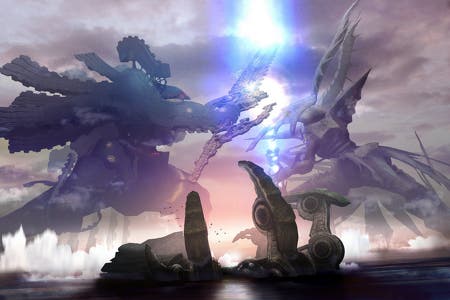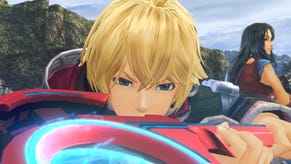Games of 2011: Xenoblade Chronicles
The year's nicest surprise.
Xenoblade Chronicles isn't the best-made game released this year. It's not quite my personal favourite, either. It's not the greatest role-playing game in what was surely a banner year for the genre; nor is it the most exciting new game from Japan or the most welcome comeback. It's not even the best Wii game of 2011. But it was something none of those games were: a lovely surprise.
We should have known better. It had been well received on its domestic release last year. So was it xenophobia that had led us to disregard the Japanese RPG's capacity for invention? Was it elitism that had written off the Wii as anything other than a home for curios, snack gaming and the occasional, dutiful prestige Nintendo release? No, it was bitter experience. The same experience that told us not to expect a game like Xenoblade to ever make its way to Europe, never mind releasing here before North America (where it will see the light of day next year) or selling out when it did so.
Unheralded (except by the fans who campaigned for its release), unsullied by hype, unburdened by expectation, Xenoblade Chronicles was a gift. And when you popped it in the machine, it was the gift that kept on giving.
Few games this year have been so faultlessly generous. It's a huge game and absolutely stuffed with collectables, side-quests and distractions, a teeming to-do list to rival a modern MMO. And in its later stages, where many single-player RPGs start to wear thin - or at least, start to narrow back down toward some climactic confrontation, leaving their other threads flapping aimlessly in the breeze - Xenoblade Chronicles establishes an end-game that may end up meaning more to you than its typically melodramatic plot.
The rebuilding of Colony 6 is a fairly simple time- and resource-sink, albeit on a monolithic scale. But as you watch a town reconstruct and a community come to life, you feel immense pride and investment in your adventure. Like Bastion, Xenoblade Chronicles doesn't just ask you to save the world, it asks what you'll do with it once it's saved. But where Supergiant's game poses a stark philosophical question, Monolith Soft and director Tetsuya Takahashi offer a typical Japanese parable of rebirth through hard work.
But it's never a chore, because Xenoblade Chronicles is generous in spirit as well as in substance. It's an incredibly welcoming game, if not in the sense of having the streamlined structure and solicitous polish of a contemporary blockbuster - indeed, its charm is distinctly rough-hewn, from the clumsy gusto of the British voice cast to the artwork that wobbles from lyrical to plain. It's welcoming because it's enthusiastic, humble and extremely keen for you to enjoy yourself all the time. Comparing it to the likes of Final Fantasy 13 is like comparing a slick chain hotel to an eccentric family-run B&B.
In fact, Xenoblade is so anxious not to withhold its delights that is almost trips over itself at the start in a mess of tutorials and innumerable bewildering systems, each with its own arcane vocabulary. But when was the last time you could accuse a JRPG (or just about any game, for that matter) of having too many ideas? This, in a year not short on sumptuous epics, is what really sets Xenoblade Chronicles apart. It's a mad contraption, a shameless kitchen-sink production that does everything it can think of, and all of it a little bit differently.
It's also - and this is one reason I'm so fond of it personally - the first and only Japanese RPG to pick up the gauntlet thrown down five years ago by the great Final Fantasy 12, a masterpiece of formal reinvention that has been roundly and disgracefully ignored by the Japanese industry (and the Western one, for that matter) ever since. FF12 made openness, immediacy and flow its watchwords; FF13, whatever you think of it, headed in precisely the opposite direction. Although there have been great examples of the genre in the intervening years (Dragon Quest 9 comes to mind), none have dared disturb the status quo.
Takahashi had other ideas, but it wasn't hubris that drove him to scrap the blueprints and start again. Quite the reverse: it was humility. The expensive and personally draining anti-climax that was his cinematic Xenosaga series led him to consider investing more modestly this time around - and pouring it all into gameplay. So we get story and action flowing smoothly together in the game engine, no random battles, an open-ish world bustling with life and an extremely fast-paced, real-time combat system with remarkably clever party AI.
It's not quite the game FF12 was - it's neither as daring nor as tidy and impeccably tuned. In combat, its sheer verve once again gets the better of it as you struggle to bring various party and status dynamics under your control. But the free movement, seat-edge tension and glorious clatter of battle are more than recompense enough. Over and above that, the play fields teem with a broad ecosystem of life and high-level monsters roam free in low-level areas - reinforcing the feeling that this isn't a scrolling diorama of grind but a real world of opportunity and risk for you to explore.
A world like Skyrim, or Azeroth, or Dark Souls' Lordran: a world that possesses a unity of place. A world that's fundamentally more important and more interesting than what goes on in it (and not just because the Bionis is not a planet or a continent but an unimaginable giant, frozen in time, with forests spilling off his limbs). A world that existed before the politics or wars or soap operas that set whatever drama you're enacting in motion - and that, with your help, will exist long after too.
That world is why I haven't even mentioned Xenoblade Chronicles' story until now (it's serviceable enough, since you asked, balancing cliché with some proper twists and likeable if stiff characters). A world like that is perhaps the greatest thing that an RPG can offer you. In fact, it could be the greatest thing that any game can offer you. Xenoblade Chronicles wasn't the only example of such a world this year, but it was perhaps the most unexpected and delightful of them all.



